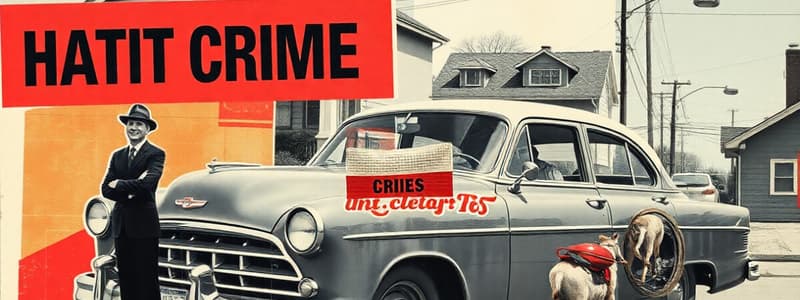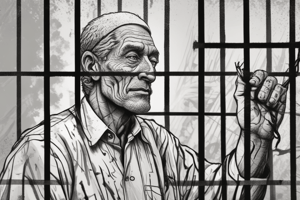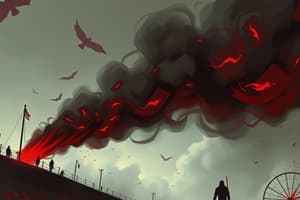Podcast
Questions and Answers
Which type of hate crime is characterized by actions motivated purely by the enjoyment or thrill of the act?
Which type of hate crime is characterized by actions motivated purely by the enjoyment or thrill of the act?
- Mission hate crimes
- Reactive hate crimes
- Thrill-seeking hate crimes (correct)
- Instinctual hate crimes
Which of the following is NOT considered a type of property crime?
Which of the following is NOT considered a type of property crime?
- Embezzlement (correct)
- Fraud
- Vandalism
- Motor vehicle theft
Which of the following descriptions of motor-vehicle crime is NOT accurate?
Which of the following descriptions of motor-vehicle crime is NOT accurate?
- It encompasses theft from a vehicle.
- It includes joyriding.
- It primarily involves the theft of a vehicle.
- It exclusively involves long-term transportation offenses. (correct)
Which criminal act involves the use of fire or explosion for property destruction?
Which criminal act involves the use of fire or explosion for property destruction?
What trend was observed in arson attack rates between 2001 and 2014?
What trend was observed in arson attack rates between 2001 and 2014?
Which of the following is a characteristic of break-and-enter crimes?
Which of the following is a characteristic of break-and-enter crimes?
Which motivation is typically associated with profit-motivated motor-vehicle crime?
Which motivation is typically associated with profit-motivated motor-vehicle crime?
Which of the following characteristics does NOT typically describe reactive hate crimes?
Which of the following characteristics does NOT typically describe reactive hate crimes?
Flashcards
Hate Crime
Hate Crime
Interpersonal violent crime driven by prejudice against victims based on their physical or social traits.
Property Crime
Property Crime
A wide range of offenses involving property, from minor acts to sophisticated professional activities.
Break and Enter
Break and Enter
Entering a property without permission.
Motor-Vehicle Crime (MVC)
Motor-Vehicle Crime (MVC)
Signup and view all the flashcards
Arson
Arson
Signup and view all the flashcards
Joyriding
Joyriding
Signup and view all the flashcards
Profit-motivated
Profit-motivated
Signup and view all the flashcards
Reactive hate crime
Reactive hate crime
Signup and view all the flashcards
Study Notes
Soc2266
- Course code: Soc2266
- Copyright holders: Kobayashi (2024) and Winterdyk (2023)
New Forms of Violence
- Hate crime involves interpersonal violence motivated by bias against victims with specific physical or social traits.
- Thrill-seeking hate crimes exist.
- Reactive hate crimes also exist.
- Mission hate crimes also exist.
Property Crime
- Property crime ranges from minor to major, even sophisticated forms.
- Activities associated include motor vehicle theft, vandalism, break-and-enter, arson, and fraud.
Break and Enter
- Break and Enter, Burglary, and Robbery are categorized as break and enter crimes
- Patterns and characteristics of these crimes are subject to discussion and analysis.
Motor-Vehicle Crime
- Motor Vehicle Crime (MVC) includes offenses like theft of cars, trucks, or SUVs and criminal damage to or theft from vehicles.
- Motivation for MVC can be joyriding, profit-motivated, short-term transportation, or long-term transportation.
Arson
- Arson involves the destruction of property by fire or explosion
- Arson rates dropped significantly between 2001 and 2014, but have remained steady since 2013.
- The damage caused by arson can be significant despite its lower frequency of occurrence.
- Different categories of juvenile arsonists were discussed. These included those playing with matches, crying for help, delinquent ones, and those severely disturbed.
- Adult fire-setting motives include arson for profit, revenge, covering up other crimes, and involvement of organized crime groups or political terrorists.
- Douglas and Olshaker investigated the early lives of rapists and other violent offenders, discovering a "homicidal triad" including arson/fire-setting, cruelty to animals, and bedwetting at inappropriate ages.
Studying That Suits You
Use AI to generate personalized quizzes and flashcards to suit your learning preferences.




